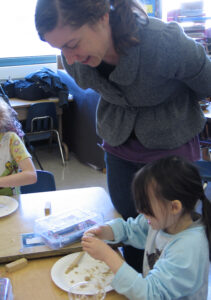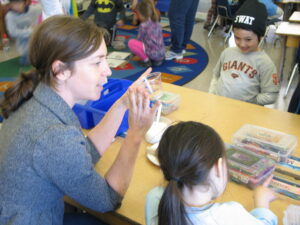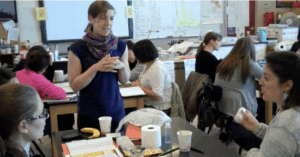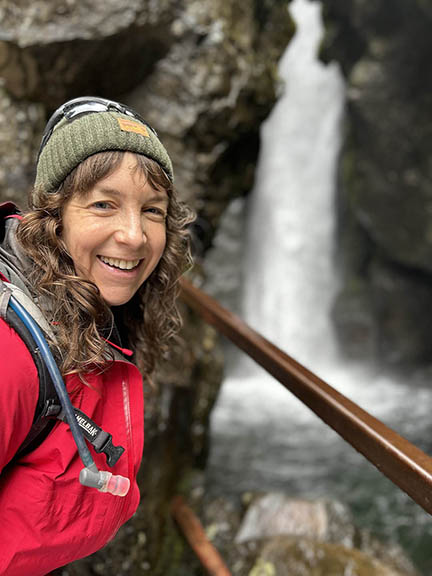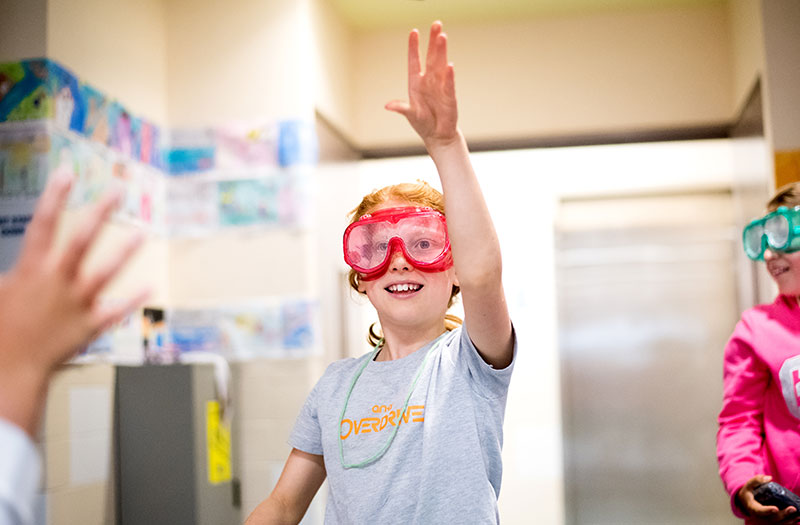Leah Plack (she/her) is program director at the Portland Metro STEM Partnership in Portland Oregon. Previously in 2009 and 2010 she was a SEP Classroom Partnership Program teacher participant and then in 2011 and 2012 she was an SEP City Science Summer Institute teacher instructor. She has a bachelor’s degree from San Diego State University in Music Performance, a teaching credential from San Francisco State University and a Master of Science in Teaching from Portland State University.
What do you do at Portland Metro STEM Partnership (PMSP)?
I work as a Program Director with PMSP. I manage and support STEAM in Early Learning, Community STEAM (our out-of-school time support network and professional development), the BIPOC STEAM Ecosystem (a collaborative of six community based organizations) and Building Joy and Justice in Mathematics (a 24-hour institute and PLC focused on making math relevant, joyful and meaningful for K-8 students).
What does your day-to-day look like in your current role? Now that I am a program director, there is quite a bit of budget management, contracting with brilliant folks who design and facilitate professional learning with us, collaborating with partners from all parts of the educational system, supporting our Community STEAM Navigator in her work, and designing and facilitating professional learning opportunities.
What is your favorite part about the work you are doing now? My favorite thing is all the relational work I get to do with partners who I have a deep respect and admiration for. We get to support people doing amazing work ensuring kids from underrepresented backgrounds have access to STEM learning opportunities, what could be better than that?
What has your career path been like? How did you end up where you are? I started as a kindergarten teacher, and I first got involved in teacher leadership because of SEP! Katherine Nielsen’s (SEP Director) son was a student in my class, so I couldn’t really say no to doing more science with a STAT partner – and I discovered that I, and my students, LOVED doing science. I also realized that increasing the science experiences also led to more practice for reading and writing for my students, in a fun and meaningful way. That realization set me on the path to becoming a science Teacher on Special Assignment in SFUSD, and later pursuing my Master’s degree which led to the work I’m doing now.
What are some skills that have helped you succeed in your career? I like to think I’m pretty good at making connections – between people, institutions, ways of thinking, and systems. Often times the world is made up of lots of silos that get in the way of the work that needs to be done, and that can create unnecessary barriers. I like to see those disconnected pieces of our systems and think about how to make the connections that are needed, keeping what is best for kids at the center.
SEP Program Experience
We know you began working with SEP in 2009, 2010 and participated in STAT (Classroom partnerships) and City Science in 2011 and 2012. What drew you to participate? How did it impact your future interest in science and career? As I said earlier, it was having Wes, Katherine’s son, in my class (Wes is now an adult which is truly wild to think about!). Participating in STAT gave me the confidence and the accountability to go ahead and do a lot more science with my students. I also have to credit my wonderful principal at the time, Nancy Schlenke, who actually encouraged me to teach a lot of science in the classroom. Later I would learn how uncommon it is to have an elementary principal who encourages their teachers to teach a lot of science.
What was your overall experience like? What did it teach you? There were three key pieces of the SEP experience that impacted me. One: It gave me a reason, and the tools and support, to prioritize teaching science with my students. Two: SEP connected me with a scientist, and getting to know them and learn more about what they did was hugely impactful in terms of opening my eyes to other career pathways, and how science works in general. Three: SEP gave me an opportunity to grow into a leadership position, when I started lead teaching the City Science Summer Institute. This opportunity, as I have shared, changed my whole career pathway.
What person, project, or aspect of the program, if any, influenced you? Each scientist I was paired with – Biljana and Brittany (both of whom I still keep up with on LinkedIn!), became friends and inspirations to me. I don’t know how I got so lucky to be paired with two incredibly brilliant, driven, and caring women who wanted to give back to their community (and were willing to work in a kindergarten classroom!) by participating in SEP.
How have you grown since your time in SEP’s programs? I would say I’m a lot more confident in my place in science education now. I didn’t have any kind of science educational background aside from the bare minimum when I started in the program, and since then I have deepened my learning around the nature of science and engineering, as well as theories around environments that support children holistically and as learners.
Do you have any fond memories you’d like to share during your time in SEP’s program(s)? I’ll never forget the low key wildness of inviting scientists to pull out living organisms (like earthworms, pillbugs, goldfish and snails) and putting them out on the tables in the classroom for 22 5-year-old children to observe, sketch, and ask questions about. I KNOW this was not a typical day at the lab for our partner scientists and I would like to think they loved every second of it.
General information
Do you have any cool hobbies/side projects you’d like to share with us? I am an avid cyclist, and I also love hiking and trail running. Anything to get me in the forest, where my love of science and exercise can merge!
What are some life lessons you’d like to share with our high school interns/participants? Your career path can take many surprising turns! Be open to new experiences and connections, you never know where they will take you. Find some great mentors, and these could be peers – sometimes peer mentors are truly the best people to understand where you are at a given time.
Anything else you’d like to tell us about yourself that you feel is fun/important? I’m a mom now, and it’s a wild journey to watch my daughter learning about science and engineering at school after all my years working in education! I am happy to say she has had some great teachers who DO teach science and engineering, and I am grateful!
